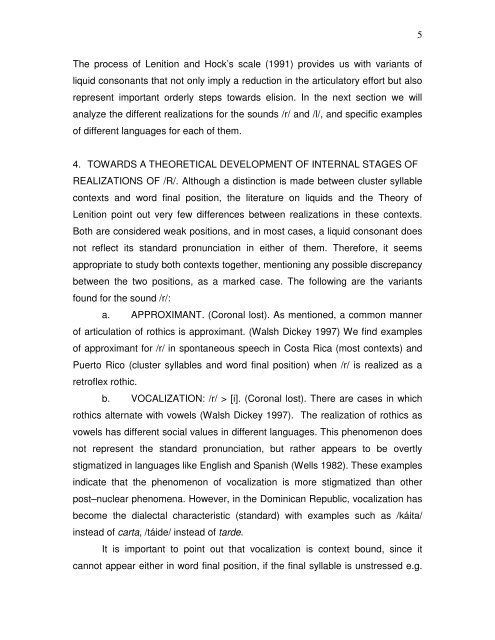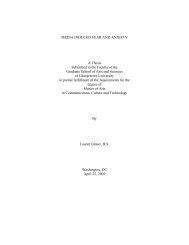From Maintenance to Elision in Cluster Syllables and Word Final ...
From Maintenance to Elision in Cluster Syllables and Word Final ...
From Maintenance to Elision in Cluster Syllables and Word Final ...
You also want an ePaper? Increase the reach of your titles
YUMPU automatically turns print PDFs into web optimized ePapers that Google loves.
5<br />
The process of Lenition <strong>and</strong> Hock’s scale (1991) provides us with variants of<br />
liquid consonants that not only imply a reduction <strong>in</strong> the articula<strong>to</strong>ry effort but also<br />
represent important orderly steps <strong>to</strong>wards elision. In the next section we will<br />
analyze the different realizations for the sounds /r/ <strong>and</strong> /l/, <strong>and</strong> specific examples<br />
of different languages for each of them.<br />
4. TOWARDS A THEORETICAL DEVELOPMENT OF INTERNAL STAGES OF<br />
REALIZATIONS OF /R/. Although a dist<strong>in</strong>ction is made between cluster syllable<br />
contexts <strong>and</strong> word f<strong>in</strong>al position, the literature on liquids <strong>and</strong> the Theory of<br />
Lenition po<strong>in</strong>t out very few differences between realizations <strong>in</strong> these contexts.<br />
Both are considered weak positions, <strong>and</strong> <strong>in</strong> most cases, a liquid consonant does<br />
not reflect its st<strong>and</strong>ard pronunciation <strong>in</strong> either of them. Therefore, it seems<br />
appropriate <strong>to</strong> study both contexts <strong>to</strong>gether, mention<strong>in</strong>g any possible discrepancy<br />
between the two positions, as a marked case. The follow<strong>in</strong>g are the variants<br />
found for the sound /r/:<br />
a. APPROXIMANT. (Coronal lost). As mentioned, a common manner<br />
of articulation of rothics is approximant. (Walsh Dickey 1997) We f<strong>in</strong>d examples<br />
of approximant for /r/ <strong>in</strong> spontaneous speech <strong>in</strong> Costa Rica (most contexts) <strong>and</strong><br />
Puer<strong>to</strong> Rico (cluster syllables <strong>and</strong> word f<strong>in</strong>al position) when /r/ is realized as a<br />
retroflex rothic.<br />
b. VOCALIZATION: /r/ > [i]. (Coronal lost). There are cases <strong>in</strong> which<br />
rothics alternate with vowels (Walsh Dickey 1997). The realization of rothics as<br />
vowels has different social values <strong>in</strong> different languages. This phenomenon does<br />
not represent the st<strong>and</strong>ard pronunciation, but rather appears <strong>to</strong> be overtly<br />
stigmatized <strong>in</strong> languages like English <strong>and</strong> Spanish (Wells 1982). These examples<br />
<strong>in</strong>dicate that the phenomenon of vocalization is more stigmatized than other<br />
post–nuclear phenomena. However, <strong>in</strong> the Dom<strong>in</strong>ican Republic, vocalization has<br />
become the dialectal characteristic (st<strong>and</strong>ard) with examples such as /káita/<br />
<strong>in</strong>stead of carta, /táide/ <strong>in</strong>stead of tarde.<br />
It is important <strong>to</strong> po<strong>in</strong>t out that vocalization is context bound, s<strong>in</strong>ce it<br />
cannot appear either <strong>in</strong> word f<strong>in</strong>al position, if the f<strong>in</strong>al syllable is unstressed e.g.
















